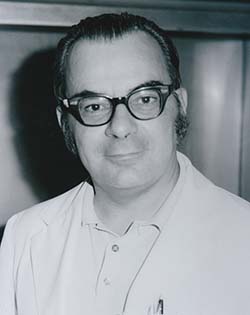 |
 |
| current issue |  | past issues |  | send a letter/news |  | address update |  | advertise |  | about us |  | alumni home |
In Memoriam
|
Alphonse Langlois '58
His discoveries helped shape the treatment of AIDS. By Jane Harrigan |
|
 At Duke University, Alphonse Langlois '58 was the meticulous microbiologist who did pioneering research on cancer and AIDS, but also liked to tell funny stories and give away the wooden racks and benches he built. At home, he was the dad who tinkered with recipes, brewed beer, and convinced his six children it was a privilege to be "allowed" to use the floor-polishing machine.
At Duke University, Alphonse Langlois '58 was the meticulous microbiologist who did pioneering research on cancer and AIDS, but also liked to tell funny stories and give away the wooden racks and benches he built. At home, he was the dad who tinkered with recipes, brewed beer, and convinced his six children it was a privilege to be "allowed" to use the floor-polishing machine.
Langlois liked things to be efficient, and he liked things to last. As a boy working in a bakery in Manchester, N.H., he suggested a change in process that let the owner produce more donuts in less time. As an undergrad at UNH, he built a barbecue grill and wading pool that his oldest daughter, Susan, found still standing nearly 20 years later—although the family's apartment on College Road was gone. After the family bought a house in Durham, N.C., Langlois ran ropes from the trash can lids up to the deck so that everyone could drop the trash in without going downstairs. "Everything he did was about making, creating, discovering," says his son Allen.
Langlois, 84, died July 2, but the influence of his research continues. He developed a cell culture that allowed a specific cancer-causing virus to be grown in a lab rather than in animals, according to his colleague Kent Weinhold, director of the Center for AIDS Research at Duke. Langlois also was part of a team that screened many compounds, looking for one that could fight HIV. "Out of that research was born AZT," Weinhold says.
Langlois grew up speaking French, and working in the Manchester shoe and textile mills. His Canadian immigrant family called him Bob to try to avoid discrimination. "It was easier to keep your head down with an American-sounding name than to walk around as Alphonse," says his youngest son, David, who cared for his father through several illnesses.
Professorships and Ph.D.s weren't on the radar when Langlois and his sister—who conducted science experiments together on the back porch of their tenement building—became the first in the family to finish high school. Moving to California in the days before interstate highways was an equally exotic idea, but that's what Langlois and Marilyn Marsh did. Their "mixed marriage" of Catholic and Protestant, frowned on at first by their families, lasted 62 years, until his death.
Marilyn was a nurse, and Langlois, who helped to care for wounded Korean War vets while stationed at Travis Air Force Base, considered becoming a doctor. After his military service, they returned to New Hampshire with two daughters, and Langlois enrolled at UNH on the GI Bill.
From his youthful hard times, he carried a hearing loss in one ear (a result of noisy mill machinery) and a drive to do whatever was necessary. He worked his way through college by painting dorms and inventorying trees for Dutch elm disease research. Once he had his bachelor's degree, he started studying for a master's in biochemistry, but an offer from Duke lured the family south. By the time he finished his doctorate in microbiology at age 37 and became a Duke professor, he and Marilyn had six children. All of them knew it was their job to get an education and become as responsible as their parents.
"He bootstrapped the whole family through sheer hard work," Allen says. "He was a great dad, a great example, and a tough act to follow."
Return to In Memoriam
blog comments powered by Disqus
